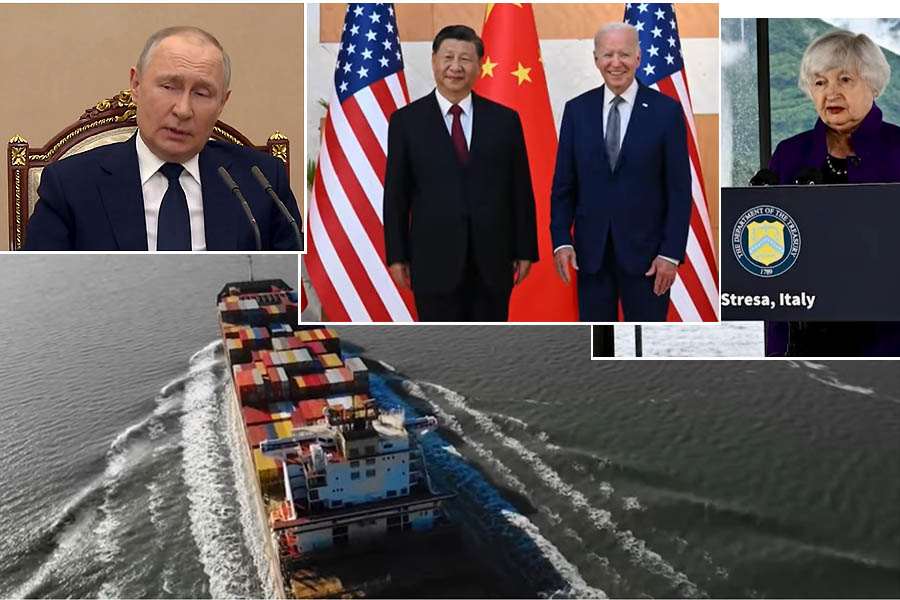
The geopolitical landscape is currently fraught with tension, as Russian President Vladimir Putin has signed a decree enabling the confiscation of U.S. private assets in Russia. This move is a direct counter to the G7's plan to seize frozen Russian assets to support Ukraine. As the economic war escalates, the potential repercussions for global financial stability are profound.
Putin's decree is comprehensive, targeting not only U.S. government properties but also assets belonging to American companies and individuals. These include securities, stakes in Russian companies, real estate, and movable property like cash. The aim is clear: if the G7 proceeds with their confiscation plan, Russia will retaliate in kind. The stakes are high, with Western banks alone having $120 billion stranded in Russia, of which $15 billion belongs to U.S. banks like Citigroup and Goldman Sachs.
G7's High-Stakes Gamble
The G7's plan to harness frozen Russian assets for Ukraine's reconstruction has significant support. European leaders have emphasized the necessity of such measures to support Ukraine's resistance and long-term rebuilding. However, the execution of this plan is fraught with risks. Russia has a history of retaliating against economic sanctions, and the potential for a tit-for-tat seizure of assets could destabilize the global financial system.
The immediate danger is palpable, but the long-term implications are equally troubling. Even if the G7's confiscation proceeds without immediate Russian retaliation, the $300 billion in frozen assets is finite. As these funds are depleted, the need for further borrowing to support Ukraine will arise, exacerbating already high deficits in the U.S. and other Western nations. The reliance on borrowing, particularly from China, to fund such initiatives is fraught with irony and danger, as China's willingness to purchase U.S. bonds could diminish further.
Germany's Pivotal Role
Germany's position within the G7 is crucial. Historically resistant to the U.S. plan due to the inherent risks, Germany's potential shift towards supporting the confiscation of Russian assets could be a watershed moment. Such a move might unlock additional funds for Ukraine, but it also opens Pandora's box, potentially triggering severe financial repercussions.
The Great Wall Against China
Amidst the Russia-Ukraine conflict, the G7 is also grappling with the challenge of containing China's industrial growth. U.S. Treasury Secretary Janet Yellen is rallying G7 members to form a united front against China's perceived unfair trade practices and industrial overcapacity. This strategic move aims to protect Western businesses and workers from the competitive pressure of China's growing industrial base.
China's rapid advancement in industries like chip manufacturing has alarmed Western economies. Europe, in particular, faces a dilemma: while aligning with the U.S. against China might seem logical, the economic implications are complex. China's export of cheap lithium-ion batteries and solar panels to Europe highlights the interconnectedness of global supply chains. Europe's energy crisis and the need for affordable green technology make Chinese goods economically attractive, despite the strategic risks.
The Economic Domino Effect
The potential for a severe trade war looms large. The U.S. has already imposed tariffs on Chinese goods, and further coordinated actions by the G7 could escalate tensions. However, such measures could backfire, harming Western economies by increasing costs for essential goods and disrupting supply chains.
China's response is likely to be multifaceted. Beijing has been focusing on bolstering its domestic consumption and industrial base to mitigate the impact of Western economic pressure. The Chinese government is raising significant funds for economic stimulus, aiming to strengthen its economy internally. This strategy not only prepares China for potential decoupling from Western markets but also positions it to outlast economic hostilities.
A Delicate Balance
The unfolding economic war between the G7, Russia, and China is a complex and high-stakes game. The G7's plan to seize Russian assets and counter China's industrial growth involves significant risks and potential global repercussions. Putin's counter-confiscation decree and China's robust economic strategies further complicate the situation. As the world watches, the actions taken by these major powers will shape the future of global economic stability and international relations.
The key question remains: can the G7 navigate this intricate landscape without triggering a catastrophic financial backlash? And will Europe side with the U.S. against China, risking economic damage in the process? The answers will unfold in the coming months, defining the next chapter of the global economic order.
Thank you for reading: globalpostheadline.com